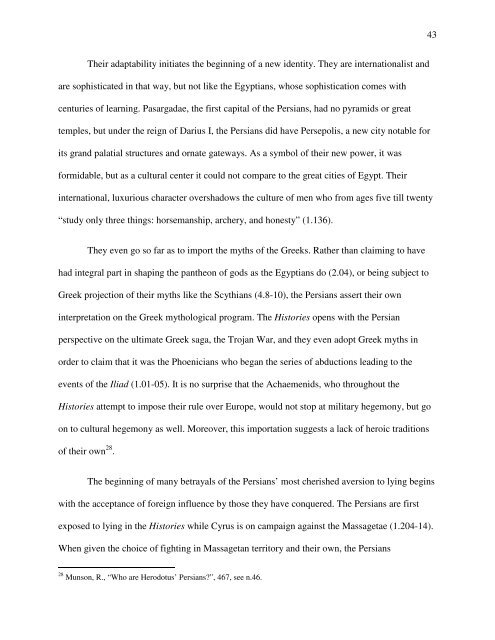The Old and the Restless - The Egyptians and the Scythians in Herodotus' Histories by Robert J. Hagan
You also want an ePaper? Increase the reach of your titles
YUMPU automatically turns print PDFs into web optimized ePapers that Google loves.
43<br />
<strong>The</strong>ir adaptability <strong>in</strong>itiates <strong>the</strong> beg<strong>in</strong>n<strong>in</strong>g of a new identity. <strong>The</strong>y are <strong>in</strong>ternationalist <strong>and</strong><br />
are sophisticated <strong>in</strong> that way, but not like <strong>the</strong> <strong>Egyptians</strong>, whose sophistication comes with<br />
centuries of learn<strong>in</strong>g. Pasargadae, <strong>the</strong> first capital of <strong>the</strong> Persians, had no pyramids or great<br />
temples, but under <strong>the</strong> reign of Darius I, <strong>the</strong> Persians did have Persepolis, a new city notable for<br />
its gr<strong>and</strong> palatial structures <strong>and</strong> ornate gateways. As a symbol of <strong>the</strong>ir new power, it was<br />
formidable, but as a cultural center it could not compare to <strong>the</strong> great cities of Egypt. <strong>The</strong>ir<br />
<strong>in</strong>ternational, luxurious character overshadows <strong>the</strong> culture of men who from ages five till twenty<br />
“study only three th<strong>in</strong>gs: horsemanship, archery, <strong>and</strong> honesty” (1.136).<br />
<strong>The</strong>y even go so far as to import <strong>the</strong> myths of <strong>the</strong> Greeks. Ra<strong>the</strong>r than claim<strong>in</strong>g to have<br />
had <strong>in</strong>tegral part <strong>in</strong> shap<strong>in</strong>g <strong>the</strong> pan<strong>the</strong>on of gods as <strong>the</strong> <strong>Egyptians</strong> do (2.04), or be<strong>in</strong>g subject to<br />
Greek projection of <strong>the</strong>ir myths like <strong>the</strong> <strong>Scythians</strong> (4.8-10), <strong>the</strong> Persians assert <strong>the</strong>ir own<br />
<strong>in</strong>terpretation on <strong>the</strong> Greek mythological program. <strong>The</strong> <strong>Histories</strong> opens with <strong>the</strong> Persian<br />
perspective on <strong>the</strong> ultimate Greek saga, <strong>the</strong> Trojan War, <strong>and</strong> <strong>the</strong>y even adopt Greek myths <strong>in</strong><br />
order to claim that it was <strong>the</strong> Phoenicians who began <strong>the</strong> series of abductions lead<strong>in</strong>g to <strong>the</strong><br />
events of <strong>the</strong> Iliad (1.01-05). It is no surprise that <strong>the</strong> Achaemenids, who throughout <strong>the</strong><br />
<strong>Histories</strong> attempt to impose <strong>the</strong>ir rule over Europe, would not stop at military hegemony, but go<br />
on to cultural hegemony as well. Moreover, this importation suggests a lack of heroic traditions<br />
of <strong>the</strong>ir own 28 .<br />
<strong>The</strong> beg<strong>in</strong>n<strong>in</strong>g of many betrayals of <strong>the</strong> Persians’ most cherished aversion to ly<strong>in</strong>g beg<strong>in</strong>s<br />
with <strong>the</strong> acceptance of foreign <strong>in</strong>fluence <strong>by</strong> those <strong>the</strong>y have conquered. <strong>The</strong> Persians are first<br />
exposed to ly<strong>in</strong>g <strong>in</strong> <strong>the</strong> <strong>Histories</strong> while Cyrus is on campaign aga<strong>in</strong>st <strong>the</strong> Massagetae (1.204-14).<br />
When given <strong>the</strong> choice of fight<strong>in</strong>g <strong>in</strong> Massagetan territory <strong>and</strong> <strong>the</strong>ir own, <strong>the</strong> Persians<br />
28 Munson, R., “Who are Herodotus’ Persians?”, 467, see n.46.
















